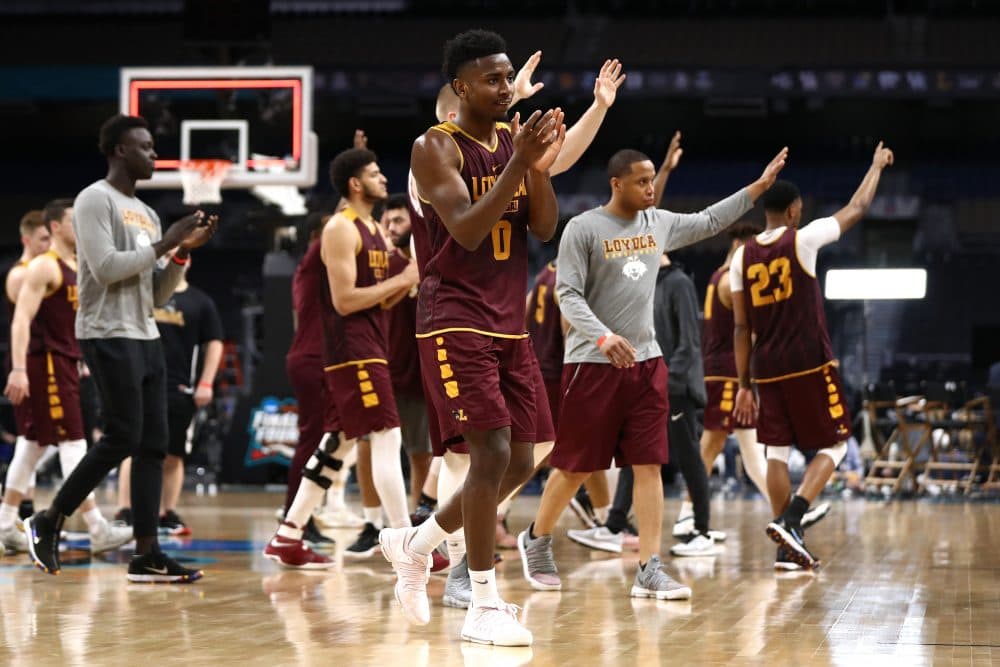Advertisement
Loyola-Chicago Marching Into Final Four With History On The Line

The No. 11 Loyola-Chicago Ramblers are just one win away from a Div. I national championship appearance and a chance at history. As it stands, the lowest seed to stand alone at the end of the "Big Dance" was Villanova in 1985, who cut down the nets as a No. 8 seed.
Other underdogs have advanced to Final Four territory before, though. So although Loyola-Chicago's run may be unexpected, it's not unprecedented.
Loyola-Chicago began the tournament in the South region with a narrow win over No. 6 Miami, before rattling off a pair of one-point victories over No. 3 Tennessee and No. 7 Nevada. In the Elite Eight, the Ramblers won by a comfortable 16-point margin against the No. 9 Kansas State Wildcats, punching their ticket to the semifinals in San Antonio this weekend.
Loyola-Chicago is the fourth No. 11 seed to make it to the final weekend of March Madness, but a win against No. 3 Michigan on Saturday evening would be historic. The last three times a No. 11 seed advanced to the Final Four, the Cinderella stories came to a premature end.
In 2006, everyone was introduced to George Mason University, the first No. 11 seed to advance to the Final Four in 20 years. The Patriots are arguably the most memorable Cinderella team in the recent history of March Madness; their overtime win against No. 1 UConn in the Elite Eight is an iconic tournament moment.
But George Mason was unable to continue its run to the national championship. The Patriots ran into the No. 3 Florida Gators in the Final Four in Indianapolis, where they fell, 73-58.
While 20 years separated George Mason from the last No. 11 team to make the Final Four — the 1986 LSU Tigers were the first to accomplish that feat — it took just five years for it to happen again.
Virginia Commonwealth University (VCU) was arguably more underrated than any of the other No. 11 seeds in this grouping, as the Rams had to play in one of the NCAA’s First Four matchups in 2011.
They had to battle USC for the right to even play in the Round of 64. But the Rams downed the Trojans by 13 points, beginning a Cinderella run of their own that was highlighted by four of five wins decided by 10 or more points. The lone squeaker for the Rams was in the Sweet Sixteen, where VCU needed overtime to beat No. 10 Florida State.
And despite a 10-point win over No. 1 seed Kansas in the Elite Eight, VCU ran into a Butler team on a Cinderella run of its own. The No. 8 Bulldogs — led by now-Celtics coach Brad Stevens — dispatched the Rams, 70-62, before seeing their own run come to an end against No. 3 UConn in the title game.
There have been a few other notable low seeds to make the Final Four, especially since the turn of the century.
Two seasons ago, the No. 10 Syracuse Orange played their way to the final weekend of the season before they met a No. 1 North Carolina Tar Heels squad that came a 3-pointer away from a title. Wichita State made it to the semifinals in 2013 as a No. 9 seed, but were unable to beat a No. 1 seed for the second time in the tournament as eventual-champion Louisville eliminated the Shockers.
A pair of No. 8 seeds made the Final Four back in 2000, but neither were able to advance any further in Indianapolis. Wisconsin scored just 41 points in a 12-point loss to No. 1 Michigan State, while North Carolina also lost by 12 in its tilt with No. 5 Florida.
Had Loyola-Chicago fallen to the No. 9 Wildcats in the Elite Eight, they would have become the fourth No. 11 seed since 2001 to make a deep run that ended in the quarterfinals. The most recent squad to do so was Xavier, last year, who were upended by No. 1 Gonzaga.
Dayton also met its demise at the hand of a No. 1 seed back in 2014, when Florida won, 62-52, as did Temple in 2001, when the Owls lost to the No. 1 Michigan State Spartans by seven.
The 2008 Steph Curry-led Davidson squad, the 2002 Missouri Tigers and the 2002 Kent State Golden Flashes were the only other double-digit seeds to advance to the Elite Eight in the new millennium. All three teams suffered double-digit losses in those contests.
Now all that stands in the way of Loyola-Chicago and a historic advancement are the Michigan Wolverines. The maize and blue are the second No. 3 seed that the Ramblers have had to play on their run, with the other being the Tennessee Volunteers in the Round of 32. Loyola-Chicago has yet to play a No. 1 seed, unlike the other three No. 11 seeds that have advanced to the Final Four. If the Ramblers were to play one of the four top-ranked teams in the tournament, they’d have to do so in the national championship game, as No. 1 Villanova and No. 1 Kansas square off in the other Final Four contest.